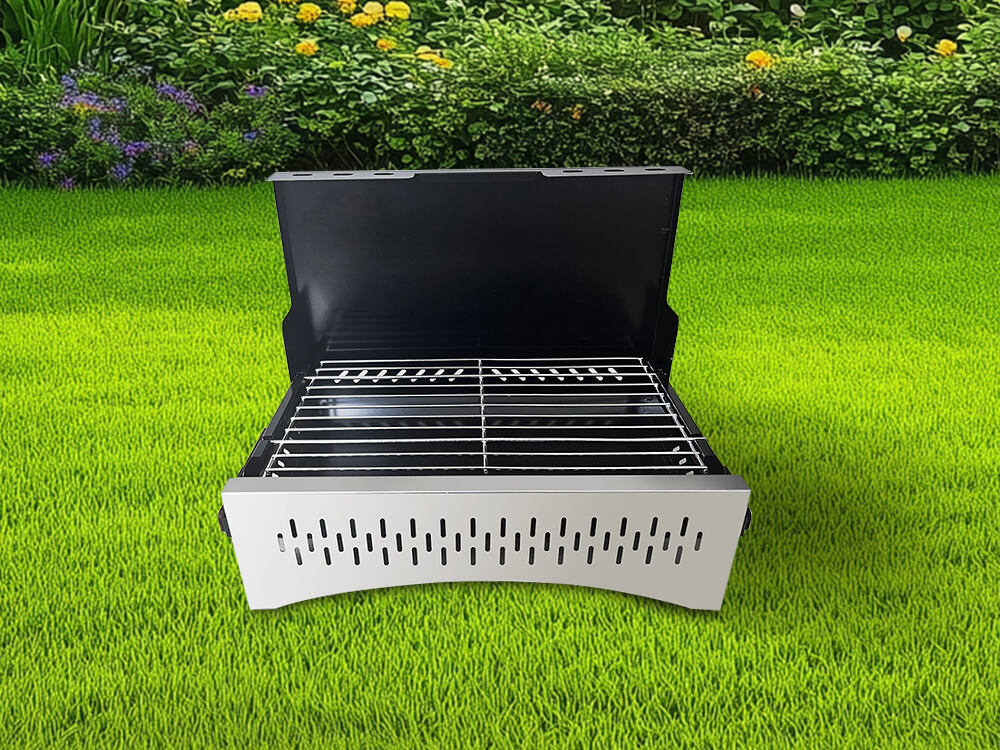Understanding BBQ Tool Materials and Durability
Stainless Steel: The Gold Standard for BBQ Accessories
When it comes to BBQ tools, stainless steel just can't be beat because it resists corrosion and rust so well, especially important when cooking outside where weather conditions vary. A recent survey found that around two thirds of grill enthusiasts actually prefer stainless steel mainly because it lasts forever basically. The stuff handles heat really well too, conducts it effectively across surfaces, which is why so many top chefs swear by their stainless steel gear despite the higher price tag. And let's face it folks, who doesn't love being able to toss those dirty spatulas into the dishwasher? For people juggling work deadlines and family dinners, this feature alone makes stainless steel worth every penny spent on quality kitchen equipment.
Cast Iron vs. Aluminum: Heat Retention and Weight Considerations
People often argue about whether cast iron or aluminum makes better BBQ tools, mainly because they care about how well something holds heat and how heavy it gets. Cast iron has this amazing ability to hold onto heat. The folks at the Institute of Food Technologists say it keeps heat going about four times longer than aluminum does, which means more even cooking temps overall. On the flip side, aluminum isn't as heavy and much easier to maneuver around the grill. It conducts heat really fast too, so great if someone wants those nice char marks from flare ups. But there's a catch – aluminum needs reheating more often during cooking. So what works best? If someone likes taking their time with slow cooked meats or doing proper sears, cast iron is probably the way to go. Quick weeknight grilling? Aluminum might be more convenient despite needing occasional adjustments.
Why Rust-Resistant Coatings Matter for Longevity
BBQ tools coated with rust resistant materials like non stick surfaces or enamel really help them last longer. The main reason? These coatings keep moisture away from metal surfaces which makes everything much more durable over time. Some research shows coated tools tend to stay good condition about 20 percent longer compared to regular ones without protection. Plus, cleaning becomes so much easier when there's no grime buildup causing rust spots. Make sure to look at those coatings every now and then to spot any wear areas before they become big problems. When cleaning, skip harsh scrubbing pads or abrasive chemicals since they'll scratch off the protective layer. A soft cloth works just fine for most situations, keeping those precious BBQ utensils functional for years instead of months.
Essential BBQ Accessories for Every Grill Master
Tongs and Spatulas: Precision Tools for Flipping and Turning
When it comes to BBQ, getting good tongs and spatulas really makes a difference. Look for tongs that have those handy locking mechanisms plus extra long handles. These let folks move around big pieces of meat without getting burned or causing accidents. Take thick steaks for instance. With longer handled tongs, there's enough leverage to flip them just right while keeping fingers away from all that intense heat. Spatulas are different though. Most come with slots cut into the head so they drain off extra juices during cooking. This helps create that nice crispy crust everyone loves on their grilled foods. Spending money on quality materials pays off in the long run. Good tools last longer and stay safe to use. A sturdy set of BBQ tongs won't bend under pressure, and solid spatulas won't break when flipping something heavy like chicken breasts or pork chops.
Meat Thermometers: Ensuring Perfect Doneness Every Time
No serious griller can do without a good meat thermometer if they want consistently great results. Digital versions give fast readings so meats actually reach those safe temps that keep everyone from getting sick after dinner. Take chicken for example the USDA says it needs to get up to around 165 degrees inside before it's done, whereas beef just needs about 145 degrees minimum. Getting those numbers right makes all the difference between overcooked dry meat and something juicy and flavorful. Many newer thermometers come with wireless capabilities too, which means cooks can check on their progress without constantly opening the grill lid. That keeps the heat stable inside and lets the food cook properly without needing constant attention every few minutes.
Grill Brushes: Maintaining a Clean Cooking Surface
Keeping a grill clean makes all the difference when it comes to getting great BBQ results, and having a decent brush around really helps. Brushing regularly stops rust from forming and gets rid of leftover bits that might mess with how food tastes. Most serious grillers know this already, though the American Grilling Association definitely backs up what experienced cooks have been saying for years - clean after each cook session. Good quality brushes usually have stiff bristles either stainless steel, brass or nylon. For those porcelain coated grates, nylon works better whereas stainless steel handles cast iron surfaces just fine. Regular brushing does more than keep things looking nice too. It cuts down on fire risks from built up grease and actually makes the grill last longer over time, which means fewer replacements needed in the long run.
Smoking Chips and Boxes: Elevating Flavor Profiles
Getting those extra layers of flavor onto grilled food is what separates good cooks from true grill masters, and smoking chips play a big role in developing those signature tastes. Woods such as hickory gives a strong smoky bite while mesquite can sometimes be too intense for delicate cuts. Cherry wood adds a sweet note that works well with pork. For folks using gas grills, a smoker box lets them get that smoky goodness without going overboard on the flavor. Most pro BBQ cooks suggest matching certain woods to particular meats and always remember to soak the chips first so they burn slower and release more smoke. Once someone gets comfortable with these basics of smoking, their backyard cookouts start looking a lot more like restaurant quality meals instead of just another weeknight dinner.
How to Choose Ergonomic and Heat-Resistant Handles
Silicone vs. Wood: Grip Comfort and Heat Protection
Picking out handle materials for BBQ tools really comes down to picking between silicone and wood when considering safety and how they feel in hand. Silicone handles keep hands cool because they don't conduct heat well, so there's much less chance of getting burned even when dealing with super hot grills. Tests show these handles work fine at around 450 degrees Fahrenheit, which makes them great for folks who deal with hot stuff all the time. Wood handles look nicer and some people find them more comfortable to grip, but they need regular care to stop them from splitting or warping over time. Most cooks end up going with what feels right based on how they cook. Getting handles that fit comfortably in the hand while keeping fingers safe from heat makes a world of difference when standing over a grill.
Length Matters: Avoiding Hand Fatigue During Long Cooks
The right length for barbecue tools makes all the difference when it comes to grilling comfort. Longer handles give much better protection from heat while also cutting down on hand fatigue during those long summer cookouts. With extra length, folks can hold onto their tongs or spatulas comfortably even after hours over the grill, which means more precise cooking without getting burned by accidental contact. Some studies point out that using ergonomically designed tools really does help reduce strain in the hands and wrists, making those backyard barbecues actually enjoyable rather than painful experiences. When picking out handle lengths, matching them to what kind of grill someone has matters a lot. Handles that are too short leave cooks vulnerable to burns, but going too long just creates unnecessary bulk that gets in the way when flipping burgers or turning steaks.
Non-Slip Features for Safe Handling in Greasy Conditions
Grilling BBQ gets messy fast, especially when grease starts flying around. That's why tools with non slip features really matter for keeping things safe. We've all been there, trying to flip something while our hands are slick from oil or rainwater dripping off the grill cover. The Consumer Product Safety Commission actually reports that slips cause quite a few kitchen injuries each year, so those non slip BBQ tools aren't just fancy extras they're pretty much must haves for anyone who takes grilling seriously. Most big name brands these days have started putting textured handles or rubber grips on their stuff to give better control when things get slippery. Before buying though, it makes sense to actually feel how comfortable the grip is. Try picturing yourself wrestling with those greasy burger patties or maneuvering through a rack covered in sauce to see if the tool stays put. Taking this extra step helps make sure we end up with gear that works reliably no matter what kind of BBQ situation comes our way.
FAQ
What is the best material for BBQ tools?
Stainless steel is highly recommended for its resistance to corrosion and rust, durability, and ease of cleaning.
Why choose cast iron over aluminum for BBQ tools?
Cast iron offers superior heat retention, ideal for consistent cooking temperatures, while aluminum is lightweight and conducts heat rapidly.
How can I prolong the lifespan of BBQ tools?
Use rust-resistant coatings, clean tools regularly, and store them in a dry environment to prevent rust and damage.
What accessories are essential for grilling?
Tongs, spatulas, meat thermometers, grill brushes, and smoking chips are essential for efficient grilling.
How do ergonomic handles improve grilling?
Ergonomic handles provide comfort and safety by reducing hand fatigue and protecting against heat.
Should I invest in premium BBQ accessories?
Investing in high-use tools like grill grates can enhance your BBQ experience, while affordable options can perform similarly to luxury brands.Â

